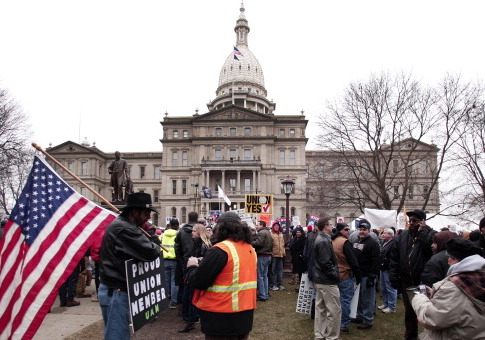A federal appeals court upheld sanctions against a union that attempted to skirt Michigan's right-to-work law.
A three-judge panel declared that the International Brotherhood of Electrical Workers could not force workers to present photo identification in order to withdraw union membership and end dues payments. The decision affirmed a ruling by the National Labor Relations Board, the nation's top federal labor regulator, that the IBEW violated the rights of workers by imposing the restrictive withdrawal procedure.
"We conclude that the Board's determination that Local 58's policy unlawfully restricted its members' rights was reasonable," the ruling says.
IBEW did not respond to request for comment or indicate whether it plans to appeal the decision.
Labor watchdogs celebrated the decision. Vinnie Vernuccio, a labor policy expert at Michigan's Mackinac Center for Public Policy, said the union's rules were a blatant attempt to flout state law and boost dues collections from dissenting employees.
"Unions are pulling out all the stops to trap workers into paying them. It is like trying to leave your cable company on steroids," he told the Washington Free Beacon. "This week's decision upholding the NLRB again shows that when the law says a union member can leave and stop paying a union, they can leave and stop paying the union."
In 2013 Michigan followed Indiana to become the second right-to-work state in the Rust Belt, a traditional labor stronghold. Right to work bars employers from mandating union membership or fee payments as a condition of employment, allowing workers to opt out following the completion of collective bargaining agreements. Many Michigan unions maneuvered to preserve union dues by negotiating extended contracts before the law went into effect. IBEW went a step further in 2014 when it mandated that "any member that desires to opt out of membership or dues deduction must do so in person at the Union Hall of IBEW Local 58 and show picture identification with a corresponding written request specifically indicating the intent of the member."
Union attorneys argued the photo ID requirement was necessary to prevent fraud, an argument both the NLRB and federal courts dismissed. The ruling said the courts have given the union room to confirm withdrawals outside of the "burdensome" step of physically presenting oneself to a union hall.
"The Board has not foreclosed Local 58 from requiring other means of verifying identification.… Local 58 was able to verify [dissenter] Ryan Greene's resignation by telephone without requiring his physical presence," the ruling said.
Greene, a worker based in Croswell, Mich., filed an unfair labor charge practice against the union to dismiss the policy with assistance from the National Right to Work Legal Defense Foundation. The nonprofit's spokesman Patrick Semmens called the decision "a victory for independent workers seeking to exercise their rights."
"This case demonstrates that even when union membership and dues payment is voluntary, whether because of state Right to Work legislation or a U.S. Supreme Court ruling, union officials regularly do whatever they can to block workers from exercising their protected legal rights," Semmens said in a statement. "Instead of cooking up schemes to trap workers like Ryan Greene into paying union dues, union officials should ask themselves why they are so afraid of giving workers a choice when it comes to union membership and dues payment."
Local 58 has seen its worker rates hold steady in the wake of right to work. Membership hovered around 4,500 members between 2013 and 2016, but federal labor filings show the union had 4,747 members in 2017, matching its 2012 size. While membership remained the same, revenue grew dramatically. The union collected more than $13.5 million in dues payments and agency fees in 2017—a 50 percent increase from the $8.9 million members paid in 2012.
